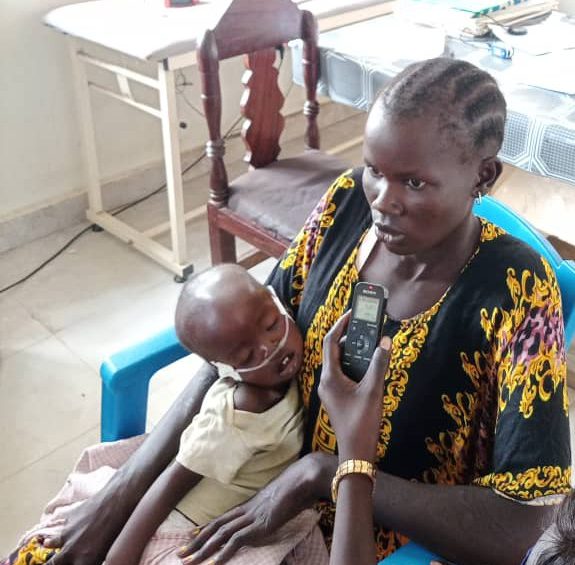
File Photo: A mother of a malnourished child at Al-Sabbah Children's Hospital in Juba - credit Jenifer James | 16 April, 2021
Mothers in Juba have revealed why some of them resort to feeding their infant children processed foods and drinks instead of exclusively breastfeeding them.
Some of the mothers who spoke with Eye Radio said that they produce little or no breast milk at all while others said they deliberately don’t breastfeed their children claiming that breastfeeding could ruin their physical beauty.
Nyanjuma a restaurant owner in Jebel Market weaned her son when he was just 5 months old and began feeding him canned milk and other processed foods.
“I give him milk from the tin and Sere lace (Infant’s formula). I feed him with those five times a day and this boy really looks healthy. I stopped breastfeeding him at 5 months because I didn’t have milk in my breast.” She said.
Suzan Godwin, a house wife who lives in Atlabara, a suburb of Juba, revealed to the interviewer that she too started giving her child processed milk at birth.
“My child is 7 months. I started giving him Nido milk at birth. From birth I didn’t produce enough breast milk. So the baby was fed with formula milk from the start. I also buy caned (mango juice) and mix it with water and that is what the baby takes.” Said Suzan.
Suzan said that she resorted to processed foods such as canned milk and power juice because the baby loves them. She also said that the alternatives to processed foods are prohibitively expensive.
“The Nido milk is good. The baby feels good when he’s given the milk. Fresh foods are very expensive. Fresh avocados that are consumed in a day cost the same as a tin of power juice that can sustain the baby for a week.” She said.
Elizabeth, a single mother of a nine months old girl told this reporter that she doesn’t breastfeed her child at all.
She said her reason for not breastfeeding the child is spectacularly different from the many mothers Eye Radio interviewed.
“From the very beginning I gave my daughter cow milk. I didn’t want to breastfeed her because I don’t want my breast to fall. I’m still too young to move around with fallen breasts,” Elizabeth declared.
Juan Betty a trader in Jebel too said that she stopped breastfeeding her child at an early age.
There was not much milk from my breast, I stopped breastfeeding my son at 7 months and started feeding him other foods.”
Experts say though, feeding their babies with processed foods present serious health and development challenges to the children.
“Processed foods are high in added sugars, salts and fats which may lead to reduction in IQ and may slow development in infants.
Children’s immune systems are also affected if subjected to too much eating of processed foods.” Ruth Muka trained nutritionist said.
Ruth said the low production of breast milk among some mothers is attributable to poor psychological wellbeing.
“One of the reasons why some mothers don’t produce breast milk is stress and depression which causes hormones flipping. Also bad feeding. If the mother doesn’t eat well she may not produce a lot of milk.”
Ruth advised that mothers should feed their children with fresh foods instead of the processed ones.
“Local Nutritious foods are so healthy for kids since they are full of natural flavors, colors and nutrients. When eaten in the right proportions, these natural foods such as fruits and green leafy vegetables, boost the immune system of the baby.”
Health experts recommend that the infants should be exclusively breastfed until the age of six months, then thereafter they can be breastfed and given supplementary foods.
Editor Note: This article was written by Lupai Moses, one of the journalists trained by Eye Radio under UNICEF’s Communication for Development project. Eye Media thanks UNICEF for the support offered in order to have this successful basic journalism training on content production to promote integrated life-saving messages and prevention of undernutrition.
Support Eye Radio, the first independent radio broadcaster of news, information & entertainment in South Sudan.
Make a monthly or a one off contribution.
Copyright 2024. All rights reserved. Eye Radio is a product of Eye Media Limited.